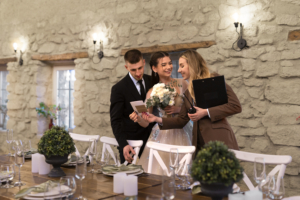A rainy wedding day may not seem ideal, but inevitably it will happen, especially here in the Pacific Northwest. Before you let clouds and rain sour your big day, tr to think of inclement weather as a good thing. Here are some positives to make that a bit easier:
FAQ About Rainy Day Weddings
Is it good if it rains on your wedding day?
It can be a good thing after reading the following tips. As with most events in life, it’s all in how you look at it!
Does rain on your wedding day mean fertility?
This has always been a fairy a tale to wish good luck, but the weather on your big day probably has no bearing on fertility.
What to do if it rains on your wedding day?
Embrace it! There are plenty of positive points to help you change your mindset.
Does rain on your wedding day bring good luck?
Old wives’ tales will tell you that rain brings good luck. However, that most likely stemmed from giving rainy day brides comfort.
Is rain on your wedding day ironic?
This is a fun question! Although Alanis Morissette sang about it in her song, it’s not really a situation of irony.
Rain on Your Wedding Day: 7 Positives
There are many different theories about what rain on your wedding day means. Some say that a rainy wedding is bad luck. However, others believe it’s good luck and signifies that your marriage will last.
So while your number one wedding fear might be having precipitation, it could be a good thing!
- Rainy weddings make for one-of-a-kind photos.
The mist and soft lighting that a rainy day provides can look romantic and is hard to create on a sunny day. Not to mention, umbrellas and rain boots could be fun props for your wedding day!
- Your wedding flowers are less likely to wilt.
If you’re planning a summer wedding or are getting married in a hot climate, you may be shocked to find out that many centerpieces end up with heat and wilted flowers by the time your reception starts!
On a rainy day, this doesn’t happen! Cooler temperatures, overcast, and humidity make flowers happier.
- Allergies and pollen are reduced if you have rain on your wedding day.
If you or members at your wedding suffer from allergies, a hot sunny day can kick your allergies into high gear. Rain reduces the pollen in the air, so if you are getting married during allergy season, a little rain can improve your wedding day.
- Rainbows are possible, depending on what time it rains on your big day.
hat comes after an intense thunderstorm and downpour? You guessed it, rainbows! In case a rainbow wasn’t the perfect backdrop for your wedding ceremony or reception, that’s just one more reason.
- Your wedding vendors will handle things with more care.
One positive side to wedding day rain is that your vendors will go above and beyond to make things go perfectly. After all, they want to keep you happy on your big day, so many will take extra precautions to ensure things go well.
- Rain on your wedding day can signify good luck.
In many cultures, a rainy day wedding signifies fertility and cleansing, and many cultures welcome rainy wedding days. So if you get some drops on your big day, remember that this slight drizzle is a sign of good luck.
- Inclement weather will make for a memorable day.
We’ve all attended fair-weather weddings. However, folks will definitely remember your big day if it’s rainy. Wet weather can add an element of fun as you overcome challenges.
Rain on Your Wedding Day – What to Do.
If you have planned an outdoor wedding, you may be crossing your fingers and just hoping that the rain won’t wash away a year or more’s worth of planning. However, remember that you can do a few things beforehand to help handle a rainy wedding day.
- Talk to your venue. See if you can relocate your ceremony and reception and what your options are.
- Embrace the rain. Roll with the punches and remember that rain isn’t the worst thing on your wedding day.
- Stay positive. Nobody wants to feel like your parade is being rained on, but don’t forget to stay positive. Whether it’s light showers or a full-blown storm, that doesn’t mean that you can’t have a fabulous wedding!
A wet wedding day might at first seem like a disaster. However, I hope this will help you find the sunny side to a rainy wedding day!


 The Key to a Memorable Culinary Experience
The Key to a Memorable Culinary Experience